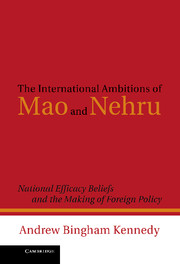 The International Ambitions of Mao and Nehru
The International Ambitions of Mao and Nehru 1 - Introduction
Published online by Cambridge University Press: 05 January 2012
Summary
The year 331 b.c. was a remarkable moment in history. It was then that Alexander confronted the Persian king Darius III at Gaugamela, an encounter that sealed the fate of one empire and heralded the rise of another. Yet it might have been otherwise. Darius had offered generous terms before the battle, including territorial concessions and a treaty of friendship and alliance. Darius also commanded a vast army, including much more cavalry than Alexander could field. Because Darius's terms were so generous, and his forces so forbidding, Alexander's most senior general, Parmenion, urged him to accept the offer. Alexander, however, refused to compromise. Confident of success, he rejected Darius's terms and laid claim to the entire Persian Empire. Subsequently, in the wake of his stunning victory at Gaugamela, Alexander pronounced himself the king of Asia.
In the study of international relations, we often assume that leaders are hemmed in by broad international structures that lie beyond their control. More specifically, scholars frequently tout the balance of power, as well as international norms and institutions, as powerful constraints on the options that leaders have. In this view, leaders themselves lack much agency or importance; they merely respond to the incentives provided by the environment. Nonetheless, leaders sometimes choose remarkably ambitious courses in foreign policy, as Alexander did, even when the international environment offers reasons for restraint. When these ambitious efforts succeed, they can have revolutionary effects, giving rise to new distributions of power and new forms of cooperation. Even when these efforts fail, they can still have important consequences, providing cautionary tales to others and reinforcing the status quo. In short, international structures still leave much room for leaders to matter in international politics. If structures “shape and shove,” as Kenneth Waltz suggests, leaders are quite capable of shoving back.
- Type
- Chapter
- Information
- The International Ambitions of Mao and NehruNational Efficacy Beliefs and the Making of Foreign Policy, pp. 1 - 9Publisher: Cambridge University PressPrint publication year: 2011


